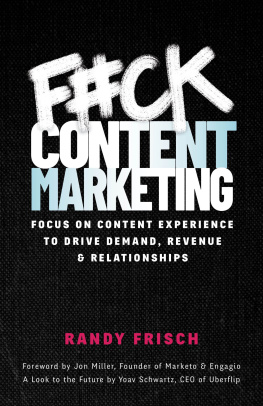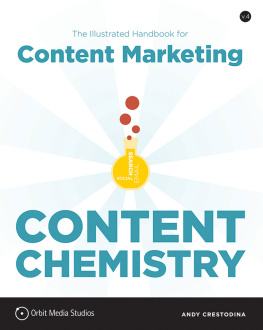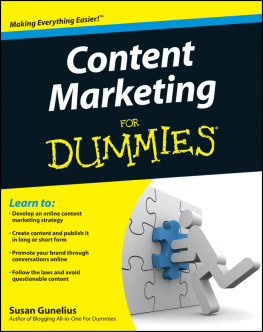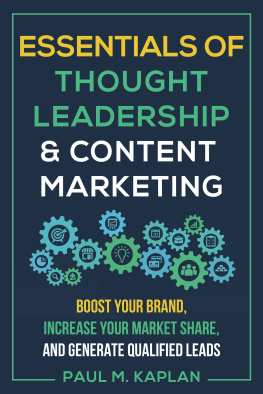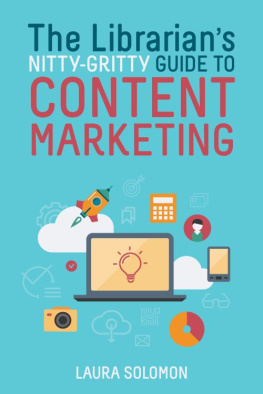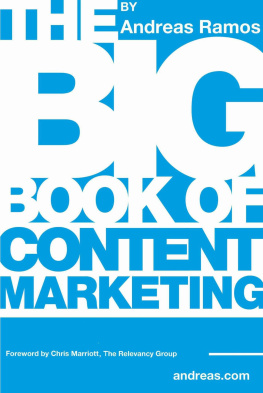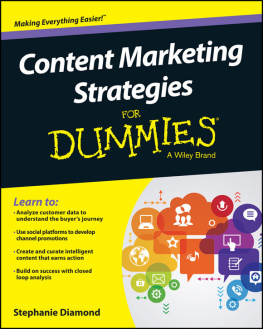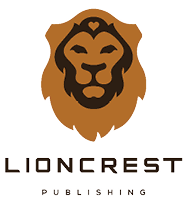All rights reserved.
Foreword
By Jon Miller
My whole career has been dedicated to pursuing the vision of a book called The One to One Future , by Don Peppers and Martha Rogers, PhD. Around the time that book dropped, I was headed for an advanced degree in physics at MIT, but suddenly, I decided I wanted to give the business world a try. So, I got a job at a management consulting firm, where I learned how to use data and analytics to help make better customer systems. I fell in love with this world and began dreaming of ways to turbocharge these systems to personalize at scale.
Thats about the time I discovered The One to One Future. The central vision of that book is the idea of the 1800s corner store. From the moment you walked in, the storekeepers knew everything about youwhether you preferred brown eggs to white eggs, whether you needed an extra bag of flour because your family was visiting next week. Because they knew you , they always knew exactly what you needed. Then, the Industrial Revolution took hold, bringing with it mass production and economies of scale. Sure, customers got greater choice and lower prices, but those benefits came at a cost: we lost that one - to - one level of personalization and relevance.
If things stopped there, we might interpret that as rather bleak. But the authors assure us theres hope. Using data and analytics, we can effectively deliver that corner - store - level of personalization at industrial - era scale. That idea has been the inspiration for my entire career.
Some of you reading this may know my resume. First, I spent some time at a company called Epiphany, a leading marketing platform in the late nineties that popped with the internet bubble some time later. After selling the company in 2005, along with Phil Fernandez, I started a company called Marketo (which, as I write this, was recently acquired by Adobe for a cool $4.75 billion). These days, Ive helped found a company called Engagio. With all of my companies, the goal is always the same: try to get close to delivering on the vision of The One to One Future .
In the service of that goal, Ive been at the center of many hot marketing trends. Marketo was one of the first modern companies to use content to build and define a brand, and we helped define the category of marketing automation. More recently, my work at Engagio has put us at the forefront of a category called Account Based Marketing (ABM), and weve used content (such as our Clear and Complete Guide to Account Based Marketing) to establish ourselves as thought leaders. So, it goes without saying that I am a passionate believer in the power and value of content marketing.
Now, at this point you may be wondering, why did the author of a book called F#ck Content Marketing ask one of content marketings biggest fans to write the foreword? Ill let Randy tell you how he arrived at that title in his own words, but heres the short version: its not the content itself that this book is rallying against, but rather the lack of support that content receives from the rest of the marketing team.
I get it. My core belief in content comes from a belief that marketing should be loved. Unfortunately, given the state of marketing today, most consumers dont feel that way, avoiding marketing wherever they can. We have ad skippers and blockers on our browsers. We gleefully hit the spam button on unwanted marketing messages. We mute the TV and pull out our smartphones during every commercial break. The dominant narrative isand has beenthat marketing is bad and should be avoided.
Basic economic theory would disagree. If somebody buys your product, they are saying that they consider your product or service more valuable than the money theyre giving you. Otherwise, they wouldnt buy it. When we marketers help facilitate a transaction, then were helping people find products and services that are valuable to them, and in turn, we are creating economic value. Were creating good in the world. From that perspective, everybody should love marketing, and yet, its painfully obvious that they dont. Why? Too often, marketing is purely promotional and not about delivering value to the recipient.
Thats why I love contentits all about delivering value. Content is educational. Content is entertaining. Content is useful. Thats why I went hard into content, and why I think other marketers did as well. Especially in the B2B world, content helps build trusted brandswhich matters since trust is critical when a complex B2B purchase can mean the difference between someone getting promoted or losing their job.
This isnt to say that content is above criticism, of course. Someone once said that marketers will flock to any successful tactic until they kill it. In my experience, that sentiment is absolutely trueand I fear that its happened to content. In the early days of Marketo, using content to build a brand was a novel, albeit successful, idea. These days, everybody and their mom is a content producer. Were all suffering from content overload.
To be clear, content is still important, especially in the B2B world. According to the IT Services Marketing Association, 75 percent of executives said that they would respond to an unsolicited marketing outreach if it contained ideas that were meaningful and relevant to their business. To accomplish relevance, content should feel as though:
- It was tailored to their specific industry.
- It was tailored to the unique needs and challenges of their business.
- It contained ideas that could help them move their business forward.
We try to avoid most of the crap that comes our way, but as soon as we know something is actually meaningful and relevant, we embrace it because it helps us do our jobs.
So relevance mattersa lot. But in todays noisy environment, relevance is necessary but not sufficient for success. The real question is, as marketers, how do we get that meaningful and relevant content in front of the people who need to see it?
The answer begins with personalization. In The Challenger Sale , authors Matthew Dixon and Brent Adamson found that the best, most successful sales people personalize every customer experience. Not only do they teach their customers as part of the sales process, but they also tailor their lessons to account for the specific business. I dont know about you, but that sounds a lot like personalized content marketing to me.
Thats the promise that drew me to this book as well. Ive known Randy since he co - founded Uberflip and later started to advocate for content experience. It became clear after our first coffee at Mimis Cafe in San Mateo that he saw the same problems with content marketing that I do, and that a focus on content experience could be the solution. The focus needs to evolve away from simply creating content and toward ensuring that content finds that right person at the right time and in the right contextin other words, that its personalized and valuable to the person receiving it. This book has all the tips you need to bring the vision of The One to One Future corner - store - level personalization at industrial - era scaleto your own organization.
Jon is a marketing entrepreneur and thought leader. He was a cofounder at Marketo, a leader in marketing automation later purchased by Adobe for $4.75 billion. Jon is currently the CEO and cofounder of Engagio, a platform that orchestrates ABM.

